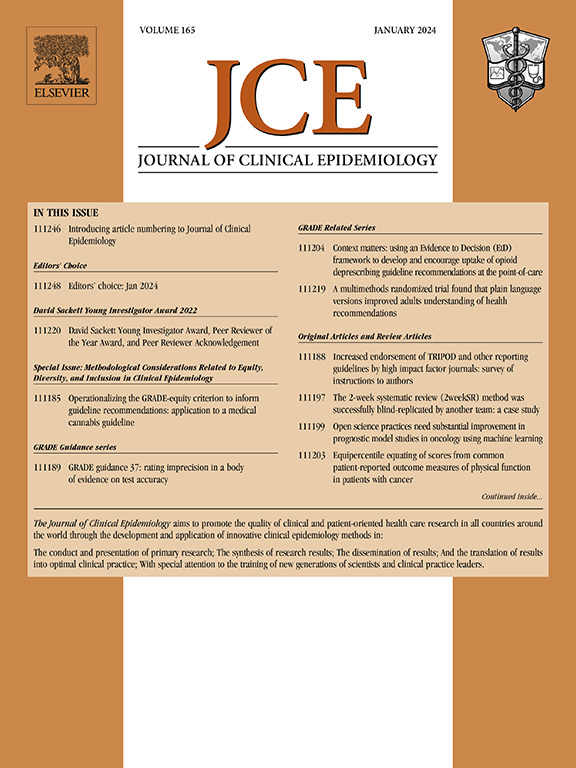调整五重奏招募干预(QRI)以优化临床试验中少数民族群体的招募:来自不同公众贡献者的研讨会的见解。
IF 5.2
2区 医学
Q1 HEALTH CARE SCIENCES & SERVICES
引用次数: 0
摘要
全球大多数人,在英国通常被称为少数民族(EM)群体,尽管有更大的疾病负担,但在临床试验中服务不足。这意味着试验结果往往不适用于全球大多数人,使不公平现象永久化。尽管有大量证据表明包容性研究存在障碍,但很少有证据表明实现新兴市场成功参与的策略。五项招募干预(QRI)已成功应用于80多项试验,以优化普通人群的招募和知情同意。我们的目标是通过英国的公共贡献者研讨会调整QRI以优化EM在试验中的招聘。方法:我们举办了5次研讨会,共有43名来自不同种族背景的公众贡献者参加。我们探讨了投稿人关注的问题,并征求了他们对调整质量指数的三个组成部分(试验讨论的录音、患者访谈和向医护专业人员提供的反馈)以及质量指数信息表和同意表格的意见。研究结果:作者最感兴趣的是讨论参与新兴市场研究的障碍(不信任、补偿不足、研究中缺乏劳动力多样性和社区外展不足)。QRI调整的主要建议包括:a)提供一份试验咨询录音副本,提前提供患者访谈问题,避免在面向患者的文件中使用小字(以促进信任);b)让具有健康状况生活经验的新兴市场群体参与培训医务人员(以避免使有害的陈规定型观念长期存在;确保培训是“针对”EMs,而不是“关于”EMs);c)提前提供QRI团队对参与者的期望(明确所涉及的情绪/精神劳动);d)讨论参与者对研究团队的期望(QRI访谈不是为了提供医疗信息);e)在保密方面提供充分的保证(避免向社区、医护人员或政府披露身份)。结论:通过关注社区的关键问题来启动社区参与是很重要的,即使这之前已经得到了很好的研究(例如,EM研究参与的障碍)。在讨论我们感兴趣的研究课题之前提供这样的空间可以培养信任。这导致贡献者提出了有见地的建议,以确保QRI适应和接受EM群体,目的是确保他们在临床试验中的代表性。本文章由计算机程序翻译,如有差异,请以英文原文为准。
Adapting the QuinteT recruitment intervention (QRI) to optimize the recruitment of ethnic minority groups in clinical trials: insights from workshops with diverse public contributors
Background
The global majority, often called ethnic minority (EM) groups in the United Kingdom (UK), are underserved in clinical trials despite a greater disease burden. This means that the trial results are often not applicable to the global majority, perpetuating inequities. Despite extensive evidence on barriers to inclusive research, there is little evidence on strategies to achieve successful EM participation. The QuinteT Recruitment Intervention (QRI) has been successfully employed in over 80 trials to optimize recruitment and informed consent in the general population. We aimed to adapt the QRI to optimize EM recruitment in trials through public contributor workshops in the UK.
Methods
We conducted five workshops with 43 public contributors from diverse ethnic backgrounds. We explored concerns of interest to contributors and sought their views on adapting three QRI components (audio-recordings of trial discussions and patient interviews and feedback provided to health-care professionals, HCPs) and QRI information sheets and consent forms.
Results
Contributors were most interested in discussing barriers to EM research participation (mistrust, inadequate compensation, lack of workforce diversity in research, and inadequate community outreach). Key suggestions for QRI adaptation included: a) offering a copy of the audio-recorded trial consultation, providing patient interview questions in advance and avoiding small print in patient-facing documentation (to foster trust); b) involving EM groups with lived experience of health conditions in training HCPs (to avoid perpetuating harmful stereotypes; ensure training is “with” EM and not “about” EM); c) providing QRI team's expectations of participants in advance (clarity on emotional/mental labor involved); d) discussing participants' expectations of the research team (QRI interviews are not for medical information provision); and e) providing ample reassurance around confidentiality (to avoid identity disclosure to their communities, HCPs, or the government).
Conclusion
It is important to initiate community engagement by focusing on key concerns in the community, though this has been previously well studied (eg, barriers to EM research participation). Providing the space for this prior to discussing our research topic of interest fostered trust. This led to contributors' insightful suggestions to ensure QRI adaptation and acceptability to EM groups, with the aim of ensuring their representation in clinical trials.
Plain Language Summary
People from ethnic minority (EM) groups are more affected by health conditions than the general population. Yet, they are missing from trials, including those on health conditions affecting them the most (eg, diabetes). Researchers have a good understanding of issues that may prevent EM trial participation (barriers), but there is little knowledge of which recruitment methods are effective for such groups. The QuinteT Recruitment Intervention (QRI) is a set of methods successfully used to improve recruitment and informed consent in trials in the general population. We wanted to adapt the QRI so that it can be used to recruit people from EM groups to trials. Over five workshops, we asked 43 public contributors from diverse ethnic backgrounds what changes to make to the following QRI methods: audio-recording of trial discussions, feedback provided to doctors and nurses, interviews with patients, and QRI information sheets and consent forms. We did not intend to discuss barriers to research participation as this has been well explored in multiple studies, but this tended to be what our contributors most wanted to talk about (such as their lack of trust in research, researchers, and health-care professionals). After this discussion, they were open to providing suggestions for QRI adaptations, including ways to foster trust (such as offering a copy of the audio-recorded trial consultation to participants). They felt that training for health-care professionals (HCPs) should be “with” input from people from EM groups rather than “about” such groups. They also provided other suggestions, including clarifying that research interviews are not for medical information provision. Overall, we learnt the importance of providing the space to discuss the community's key concerns before discussing our research topic of interest, even when these concerns have been well explored in the existing research. This helped foster trust among contributors and led to important suggestions on how best to adapt the QRI to help ethnic minority participation in trials. We will now work with a wider group of people, including researchers, doctors, and nurses, to take these suggestions forward in our future QRIs.
求助全文
通过发布文献求助,成功后即可免费获取论文全文。
去求助
来源期刊

Journal of Clinical Epidemiology
医学-公共卫生、环境卫生与职业卫生
CiteScore
12.00
自引率
6.90%
发文量
320
审稿时长
44 days
期刊介绍:
The Journal of Clinical Epidemiology strives to enhance the quality of clinical and patient-oriented healthcare research by advancing and applying innovative methods in conducting, presenting, synthesizing, disseminating, and translating research results into optimal clinical practice. Special emphasis is placed on training new generations of scientists and clinical practice leaders.
 求助内容:
求助内容: 应助结果提醒方式:
应助结果提醒方式:


